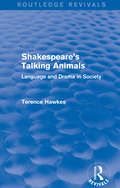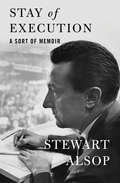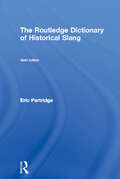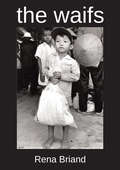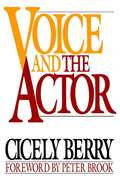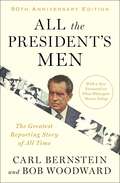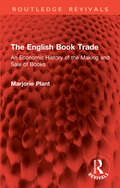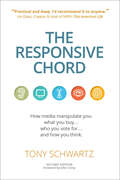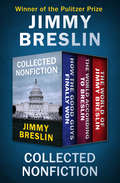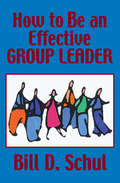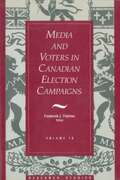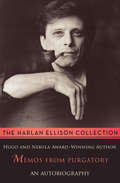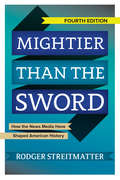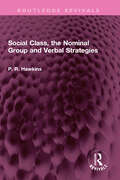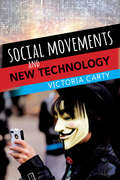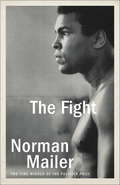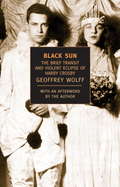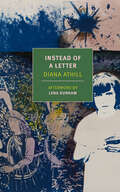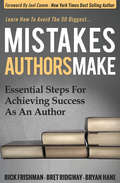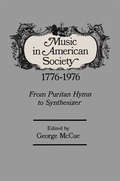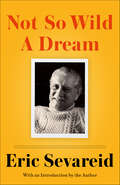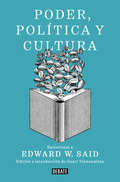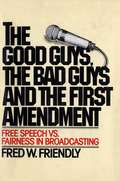- Table View
- List View
Routledge Revivals (1973): Language and Drama in Society
by Terence HawkesFirst published in 1973, this book is about Shakespeare, language and drama. The first part introduces some common ideas of anthropology and linguistics into an area where they serve as a base for the discussion of usually literary matters. It attempts to link language to our experience of speech — examining its range, texture, and social functions. In part two, the author argues that in Elizabethan culture there was a greater investment in the complexities and demands of speech due to the widespread illiteracy of the time. It examines eight of Shakespeare’s plays, together with one of Ben Jonson’s, in light of their concern with various aspects of the role of spoken language in society.
Stay of Execution: A Sort of Memoir
by Stewart AlsopA poignant memoir of a full life and an impending death, written by one of America&’s foremost journalists during his battle with terminal cancer. For three decades, from the end of World War II well into the Watergate era, internationally renowned newspaper and magazine columnist Stewart Alsop was a fixture on the Washington, DC, political landscape. In 1971, the respected journalist was diagnosed with a rare form of leukemia, marking the beginning of his courageous three-year battle with the terrible cancer that ravaged his body but could not damage his spirit or slow his facile and brilliantly incisive mind. A passionate social critic and peerless political analyst who hobnobbed with presidents from FDR to Nixon, and enjoyed the respectful fellowship of such notable figures as Winston Churchill, Alice Roosevelt Longworth, and Henry Kissinger, Alsop insightfully chronicles the course of his medical history without a trace of maudlin self-pity while celebrating his family, friends, colleagues, and an extraordinary life well lived. Stay of Execution is Stewart Alsop&’s moving, powerful, and inspiring memoir of his terminal illness and his life before—an unforgettable true story of courage and accomplishment, trials and tragedy from one of the most revered American journalists of the twentieth century.
The Routledge Dictionary of Historical Slang
by Eric PartridgeDrawn from the Dictionary of Slang and Unconventional English, with the emphasis on the expressions used or coined before 1914.
The Waifs
by Rena BriandA fascinating story for anyone interested in the adoption of vulnerable mixed-race children abandoned in the aftermath of war. When Rena Briand adopted Tuyen, a Vietnamese orphan, and successfully brought her to Australia, dozens of families aspired to do the same. Rena Briand's "The Waifs" is a compelling story about battling officialdom with resilience and determination. A tale on how a handful of compassionate women fought to get a few Vietnamese waifs to Australia. Their opponents were formidable - conniving politicians hypocritical church leaders racist social workers and the phony "charitables" of Toorak. A moving and courageous story.
Voice and the Actor
by Cicely BerryThere is no right way--there are only a million wrong ways, which are wrong because they deny what would otherwise be affirmed. Wrong uses of the voice are those that constipate feeling, constrict activity, blunt expression, level out idiosyncrasy, generalize experience, coarsen intimacy. These blockages are multiple and are the results of acquired habits that have become part of the automatic vocal equipment; unnoticed and unknown, they stand between the actor's voice as it is and as it could be and they will not vanish by themselves. So the work is not how to do but how to permit: how, in fact, to set the voice free. And since life in the voice springs from emotion, drab and uninspiring technical exercises can never be sufficient. Cicely Berry never departs from the fundamental recognition that speaking is part of a whole: an expression of inner life.
All the President's Men (Bloomsbury Film Classics Ser.)
by Bob Woodward Carl Bernstein50th Anniversary Edition—With a new foreword on what Watergate means today. &“The work that brought down a presidency...perhaps the most influential piece of journalism in history&” (Time)—from the #1 New York Times bestselling authors of The Final Days. The most devastating political detective story of the century: two Washington Post reporters, whose brilliant, Pulitzer Prize-winning investigation smashed the Watergate scandal wide open, tell the behind-the-scenes drama the way it really happened. One of Time magazine&’s All-Time 100 Best Nonfiction Books, this is the book that changed America. Published just months before President Nixon&’s resignation, All the President&’s Men revealed the full scope of the scandal and introduced for the first time the mysterious &“Deep Throat.&” Beginning with the story of a simple burglary at Democratic headquarters and then continuing through headline after headline, Bernstein and Woodward deliver a riveting firsthand account of their reporting. Their explosive reports won a Pulitzer Prize for The Washington Post, toppled the president, and have since inspired generations of reporters. All the President&’s Men is a riveting detective story, capturing the exhilarating rush of the biggest presidential scandal in US history as it unfolded in real time.
Inside Story
by Brit HumeBrit Hume takes you back to a day when investigative reporting belonged to the brave writers and editors rather than the libel-frightened corporate owners of today. Inside Story is Hume's account of his work with columnist Jack Anderson. Follow Hume as he helps break scandals that bring multi-national coporations and members of the Nixon administration to their knees. This is a fascinating look at politics and corruption in early 1970s Washington.
The English Book Trade: An Economic History of the Making and Sale of Books (Routledge Revivals)
by Marjorie PlantOriginally published in 1938, and as a third edition in 1974, this volume presents the results of original research into the economic aspects of the transition from the medieval manuscript to the modern printed book. It discusses the problems of supply of materials and labour created by the introduction of machinery and the growth of the literary market. The social evolution of the printing crafts is portrayed, focussing first upon the Stationers’ Company and later upon the trade union. The book traces the development of the author-printer-publisher relationship, and its bearing on the question of copyright and reviews, inter alia the organisation and price policy of bookselling from the days of legal maximum prices to the net book agreement. The 3rd edition contains sections on Public Lending Right, paperbacks, photo-copying in its relation to publishing and the rise of international publishing..
The Responsive Chord: How Media Manipulate You: What You Buy . . . Who You Vote For . . . and How You Think.
by Tony SchwartzThe classic work on how media affects us by the man who helped create the most famous political ad in television history.Tony Schwartz drew on his unparalleled experience in the communications industry to give us The Responsive Chord, an engaging read and one of the seminal books on media. Famed for his “Daisy” campaign ad and a pioneering anti-tobacco PSA, Schwartz came to understand that most advertisers, politicians, and educators?in fact, almost all of us?use a model of communication long outmoded by the coming of electronic media: a model which has made us blind to many of the inner workings of modern communication.In The Responsive Chord, he puts forth the resonance principle—that the meaning of an ad (or any other piece of communication) is not present in the ad itself but rather in how the ad relates to the vast array of knowledge and associations already held in the mind of the viewer, both factual and emotional. Thus, audience members do not merely digest a message; they are an essential force in creating it. Schwartz guides us through the many fascinating consequences. The implications for anyone looking to impart a message or influence decisions are enormous.With so many people now getting their information through social media and “fake news” sites, it is crucial that we understand the strong forces by which these outlets act upon us and, yes, manipulate our ideas and actions. The Responsive Chord reveals these forces in a compelling, revealing read.“I read The Responsive Chord as a freshman in college and it affected everything I've ever made since. Its message is practical and deep. I'd recommend it to anyone.”?Ira Glass, creator and host of NPR's This American Life“Maybe reading this book will prepare us to think more critically about the way social media is used on, and against, us today.”?Douglas Rushkoff, author, Program or Be Programmed
Chronicles Of Wasted Time: Part I: The Green Stick
by Malcolm MuggeridgeChronicles of Wasted Time Part I The Green Stick
Collected Nonfiction: How the Good Guys Finally Won, The World According to Breslin, and The World of Jimmy Breslin
by Jimmy BreslinColorful, riveting reportage from a one-of-a-kind Pulitzer Prize–winning journalist and New York Times–bestselling author. In his career as a legendary New York City newspaper columnist, Jimmy Breslin “leveled the powerful and elevated the powerless for more than fifty years with brick-hard words and a jagged-glass wit” (The New York Times). How the Good Guys Finally Won: Following the burglary of the Democratic National Committee headquarters at the Watergate Hotel, as evidence increasingly mounted against President Richard Nixon, Thomas “Tip” O’Neill, the Majority Leader in the House of Representatives, led the charge calling for impeachment. In this New York Times bestseller, Breslin’s blow-by-blow, conviction-by-conviction account is a gripping reminder of how O’Neill and his colleagues brought justice to those who abused their power, and revived America after the greatest political scandal in its history. “Breslin’s reporting is superb and so is his prose, his insights keen and often startling, his wit unceasing.” —Chicago Tribune The World According to Breslin: In an illustrious career that spanned decades, the seven years that Breslin spent at the New YorkDaily News sparked some of his finest work. When New York City tumbled into economic and social chaos at the end of the 1970s, Breslin was there. In this collection of classic columns, he looks at the city not from the top down but from the bottom up, heralding the heroism of average New Yorkers. “Superb . . . a master of the tough-talking, thoroughly researched, contentious, street-wise vignette.” —San Francisco Chronicle The World of Jimmy Breslin: In the 1960s, as the once-proud New York Herald Tribune spiraled into bankruptcy, the brightest light in its pages was an ebullient young columnist named Jimmy Breslin. While ordinary columnists wrote about politics, culture, or the economy, Breslin’s chief topics were the city and himself. He was chummy with cops, arsonists, and thieves, and told their stories with grace, wit, and lightning-quick prose. Whether covering the five boroughs, Vietnam, or the death of John F. Kennedy, Breslin managed to find great characters wherever he went. “Breslin’s touch is absolutely sure.” —The Washington Post Book World
How to Be an Effective Group Leader
by Bill D. SchulArmed with Bill Schul&’s guidance, even the shyest person can become a powerful and effective leader. Learn goal-setting methods, keys for maximizing group participation, and the do's and don&’ts of leadership. This how-to also covers the best ways to establish your group&’s atmosphere and tips for holding productive meetings. Whether you&’re in a leadership role now or expect to attain one, this straightforward text will help you achieve your ambitions. Plus, the information is equally valid for social, civic, government and business organizations.
Media And Voters In Canadian Election Campaigns
by Frederick J. FletcherThis volume presents five studies on the relationship between the media and voters. Each examines some aspects of the flow of information to voters during election campaigns and all reflect the assumption that the right to vote must include the right of access and sufficient information to make an informed decision. In separate studies, Jean Crête and Robert MacDermid examine existing studies and data on the relationship between attention to media and voter information and behaviours. Both studies discuss methods for improving voter information. Televised leaders debates have become an important feature of democratic elections. Cathy Widdis Barr examines the effects of these debates on Canadian voters in 1984 and 1988, concluding that they were an important source of campaign information for less-informed voters. Robert Bernier and Denis Monière provide the most comprehensive comparative overview available on the importance of televised leaders debates and the policy issues surrounding them in democratic countries. Finally, Lyndsay Green examines the potential of new communication technologies for improving the information available to voters during campaigns, with particular attention to voters with special information needs. Taken together, the five studies provide a useful overview of the effectiveness of various forms of campaign communication in informing voters. Much of the material presented here is not readily available elsewhere.
Memos from Purgatory: An Autobiography
by Harlan EllisonHemingway said, "A man should never write what he doesn't know." In the mid-fifties, Harlan Ellison--kicked out of college and hungry to write--went to New York to start his career. It was a time of street gangs, rumbles, kids with switchblades, and zip guns made from car radio antennas. Ellison was barely out of his teens himself, but he took a phony name, moved into Brooklyn's dangerous Red Hook section, and managed to con his way into a "bopping club." What he experienced (and the time he spent in jail as a result) was the basis for the violent story that Alfred Hitchcock filmed as the first of his hour-long TV dramas. This autobiography is a book whose message you will not be able to ignore or forget.
Mightier than the Sword
by Rodger StreitmatterIn this engaging examination of the media’s influence on US history and politics, Rodger Streitmatter visits sixteen landmark episodes, from the American Revolution to the present-day fight for gay and lesbian marriage equality. In each of these cases, Streitmatter succinctly illustrates the enormous role that journalism has played in not merely recording this nation’s history but also in actively shaping it. Mightier than the Sword offers students and professors a highly readable and accessible alternative to journalism history textbooks. Instead of trying to document every detail in the development of US media through dry, dull lists of names, dates, and headlines, this book focuses on sixteen discrete episodes that illustrate a point that is much larger than the sum of their parts: media have played and continue to play an enormous role in shaping this nation. The fourth edition features an entirely new chapter on the way US media have championed various gay and lesbian rights initiatives, from the 2003 Lawrence vs. Texas sodomy case through the June 2013 Supreme Court decision striking down DOMA (the Defense of Marriage Act). Balancing criticism and celebration of news media and exploring both print and electronic platforms, Mightier than the Sword provides students with a sense of the power and responsibility inherent in the institution of journalism.
Social Class, the Nominal Group and Verbal Strategies (Routledge Revivals)
by P R HawkinsFirst published in 1977, Social Class, the Nominal Group and Verbal Strategies reports on the results of a grammatical analysis of the speech of a large sample (about 300) of five-year-old middle- and working-class children. The author is concerned in particular to answer the questions: What is the relationship, within certain restricted contexts, between the use of particular grammatical structures and factors such as social class, IQ and sex? How are any differences in the type or frequency of structures to be interpreted? The central part of the book presents the results of a set of correlations: the correlations of linguistic categories on the one hand, with sociological or ‘background’ categories on the other. The author then sets this study and its results in the perspective of related research and comments on some aspects of the ‘deficit-difference’ controversy. Finally, he presents his own conclusions in a detailed discussion. He argues that, instead of trying to ascertain the purely linguistic competence of children from different backgrounds, we must rather compare the different verbal strategies they use in a particular situation or context. The book will be of interest to students of language, linguistics, pedagogy and education.
Social Movements and New Technology
by Victoria CartyThe emergence of new information communication technologies-such as the Internet and social media networking sites and platforms-has strongly affected social movement activism. In this compelling and timely book, Victoria Carty examines these movements and their uses of digital technologies within the context of social movement theory and history. With an accessible and unique mix of theory and real-world examples, Social Movements and New Technology takes readers on a tour through MoveOn and Tea Party e-mail campaigns, the hacktavist tactics of Anonymous, global online protests against rapists and rape culture, and the tweets and Facebook pages that accompanied uprisings across the Arab world, Europe, and the United States. In each case study, the reader is invited to examine the movement, organization or protest and their use of digital tools through the lens of social movement theory. Discussion questions at the end of each chapter invite critical thinking and further reflection and debate.
The Fight
by Norman MailerIn 1974 in Kinshasa, Zaïre, two African American boxers were paid five million dollars apiece to fight each other. One was Muhammad Ali, the aging but irrepressible "professor of boxing." The other was George Foreman, who was as taciturn as Ali was voluble. Observing them was Norman Mailer, a commentator of unparalleled energy, acumen, and audacity. Whether he is analyzing the fighters' moves, interpreting their characters, or weighing their competing claims on the African and American souls, Mailer's grasp of the titanic battle's feints and stratagems--and his sensitivity to their deeper symbolism--makes this book a masterpiece of the literature of sport.
Black Sun
by Geoffrey WolffIncludes an afterword by the author. Harry Crosby was the godson of J. P. Morgan and a friend of Ernest Hemingway. Living in Paris in the twenties and directing the Black Sun Press, which published James Joyce among others, Crosby was at the center of the wild life of the lost generation. Drugs, drink, sex, gambling, the deliberate derangement of the senses in the pursuit of transcendent revelation: these were Crosby's pastimes until 1929, when he shot his girlfriend, the recent bride of another man, and then himself. Black Sun is novelist and master biographer Geoffrey Wolff's subtle and striking picture of a man who killed himself to make his life a work of art.
Instead of a Letter
by Diana AthillWhen Diana Athill, nearly forty-three and far from a household name, sat down to write Instead of a Letter, the first in her series of trailblazing memoirs, she was looking for an answer to the question &“What have I lived for?&” In this searching book, she recalls her child-hood on her grandparents&’ magnificent estate, the teenage romance that was certain to lead to marriage, her university days coinciding with the Second World War, and the sudden dissolution of her engagement, a loss that became the defining experience of the next twenty years of her life. Athill is as forthright in confessing her faults as she is in celebrating her triumphs. &“From this table, with this white tea-cup, full ashtray, and small glass half full of rum beside me,&” she writes, &“I see my story, ordinary enough though it has all been and sad though much of it was, as a success story.&”
Mistakes Authors Make: Essential Steps for Achieving Success as an Author
by Rick Frishman Bret Ridgway Bryan Hane&“Features 50 of the most common errors book authors make in writing, publishing, and promoting their books.&” —John Kremer, author of 1001 Ways to Market Your Books The publishing landscape can be a tricky one to navigate. There are so many aspects to authoring and publishing a book that it&’s easy for you to make critical mistakes that can set you off course and significantly decrease your chances for success. How many of the 50 biggest author mistakes are you making? When you learn to avoid them, you can greatly enhance your chances for success in the publishing world. In this insider&’s look at the worlds of publishing and book marketing coauthors Rick Frishman, Bret Ridgway, and Bryan Hane bring their 65 combined years of experience in the publishing world to you and share their secrets to success. You&’ll learn: How to master media and other key marketing channels authors should useKeys to capturing the browsing buyer in bookstores and onlineThe new publishing landscape and how it impacts youHow to increase the readability of your book so readers keep coming backHow your book is the key piece of your own information marketing empireAnd much, much more &“If you want to write a book or make sure that your book is a smashing success read this now and take action! You&’ll be amazed at the difference it will make in your success!&” —John Assaraf, New York Times–bestselling author of Innercise and The Answer &“I LOVE the book so far! Clear-concise-comprehensive with practical info the aspiring author needs!&” —Laura Venecia Rodriguez, author of Yoga at Home
Music in American Society: From Puritan Hymn To Synthesizer
by George McCueThis book is the literary legacy of a national music festival in St. Louis, organized to identify as clearly as possible the specifically native character of music originating in the United States of America. The festival—the Bicentennial Horizons of American Music and the Performing Arts (B.H.A.M.)—sponsored more than 250 performances and workshops between Flag Day and Independence Day 1976. It was the only event of the Bicentennial celebration to address itself to a survey and evaluation of the musical development of this country.
Not So Wild A Dream
by Eric Sevareid"For anyone even remotely interested in American literature and journalism, Not So Wild a Dream is a must-read, and a joy."– Dan RatherIn this captivating first-person account, Eric Sevareid describes in thrilling detail his time as a journalist covering international affairs during World War II. From a young man in North Dakota to an instrumental figure in establishing CBS as an international news organization, Sevareid witnessed the shaping of America’s journalistic landscape. His experiences provide an invaluable glimpse into the trials and tribulations of a dogged reporter. With current distrust of the press on the rise, Sevareid’s insight is poignant and all the more necessary."The book is an excellent sketch of the war's progress, and a thoughtful personal record of Mr. Sevareid's adventures--one of the most far ranging war correspondent journals yet published."– Library Journal
Poder, política y cultura
by Edward W. SaidUna compilación de las mejores entrevistas a Edward W. Said y la incursión definitiva en la mente de uno de los literatos más notorios de nuestro tiempo. Edward W. Said fue uno de los grandes intelectuales del siglo XX. La agudeza de sus reflexiones y la profundidad con la que veía el mundo marcan profundamente una obra que posee el poder de hallar respuestas en los sitios más inusuales. La pasión de Said por la cultura y las civilizaciones de Oriente y Occidente se transmite con un ímpetu extraordinario en este volumen, compuesto por 28 entrevistas que abordan temas tan diferentes como son la música, la historia, la política o la literatura. Desde Palestina hasta Pavarotti, pasando por el colonialismo y la acción política, Edward W. Said reflexiona sobre las figuras de Austen, Beckett, Conrad, Rushdie, Bloom y Foucault, entre muchos otros, y nos invita a perdernos en los entresijos su mente. Una invitación sin precedentes a perdernos en los entresijos su mente. Reseñas:«Una incursión en la mente de un hombre cuyos textos constituyen una crónica brillante, que cuestiona los valores y la cultura contemporáneos.»Nadine Gordimer «Esta colección de entrevistas es fascinante; manifiesta a la perfección las introspecciones paradójicas y las ambigüedades profundas del autor y, en el proceso, se nos presenta el retrato -que resulta impactante por su timidez tan natural? de un personaje tan interesante como imprescindible.»A.C.Grayling, Indepdendent on Sunday «Brillante y apasionado, de una honestidad arrolladora y una lucidez firme.»Terry Eagleton, New Statesman «Esta recopilación sirve a modo de biografía intelectual; leer entrevistas es leer la vida de un hombre a través de las personas que le dirigen las preguntas. Y es difícil pensar en cualquier otro literato cuya experiencia pudiera plasmarse de esta forma en semejante obra.»Scotsman
The Good Guys, the Bad Guys and the First Amendment: Free Speech Vs. Fairness in Broadcasting
by Fred W. FriendlyUnlike newspapers, TV and radio broadcasting is subject to government regulation in the form of the FCC and the Fairness Doctrine, which requires stations "to devote a reasonable amount of broadcast time to the discussion of controversial issues" and "to do so farily, in order to afford reasonable opportunity for opposing viewpoints." In this provocative book, Fred W. Friendly, former president of CBS News examines the complex and critical arguments both for and against the Fairness Doctrine by analyzing the legal battles it has provoked.
